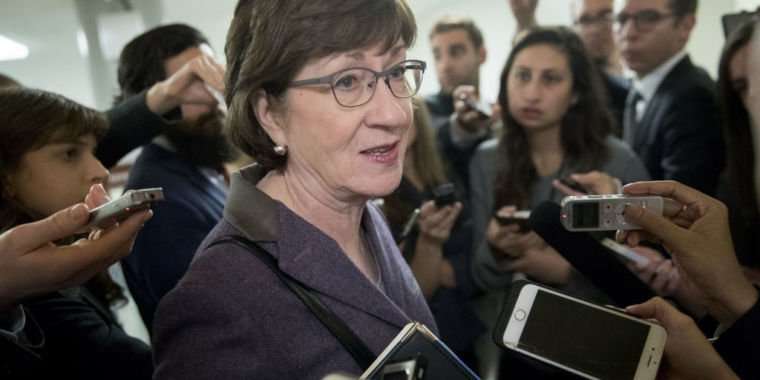A Democratic effort to reinstate net neutrality rules has won support from a Republican senator and could pass in the Senate if just one more Republican breaks with the GOP.
A Congressional Review Act (CRA) resolution from Sen. Ed Markey (D-Mass.) to reverse the Federal Communications Commission's net neutrality repeal would need votes from all Democrats and two Republicans in order to pass through the Senate. Sen. Susan Collins (R-Maine) today became the first Republican senator to pledge support for the repeal reversal.
"Senator Collins does not support the FCC's recent decision to repeal net neutrality rules, and she will support Senator Markey's legislation that would overturn the FCC's vote," a spokesperson for Collins told The Hill and other news outlets today. Further Reading Restoration of net neutrality rules hits key milestone in Senate
Collins had previously urged the FCC to preserve net neutrality rules. She and Sen. Angus King, an independent from Maine who caucuses with Democrats, last month called on FCC Chairman Ajit Pai to cancel the repeal vote. Pai's Republican majority went ahead with the repeal on December 14.
Forty-three senators have publicly supported Markey's bill, and Democrats intend to force a vote of the full Senate. Fifty-one votes would be needed for passage.
The CRA resolution faces dim prospects in the House and would likely be vetoed by President Trump even if it passes both chambers of Congress. But Democrats want a vote in the Senate to force Republicans to go on the record for or against net neutrality rules. Polls show that net neutrality rules have majority support from both Democratic and Republican voters, and it could be a prominent campaign issue in the congressional elections this year.
"We're going to be fighting to save the free and open Internet while Republicans are fighting to hand it over to corporations," US Senate Minority Leader Chuck Schumer (D-N.Y.) said at a press conference today. "With a roll call vote, Republicans will have a chance to right the [Trump] administration's wrong and Americans can see for themselves who really has their back in this Congress."
The net neutrality repeal will allow Internet service providers to block and throttle Internet traffic as long as they disclose the practices publicly. ISPs will also be allowed to offer priority to websites and online services in exchange for payment. The FCC also eliminated various other consumer protections, such as rules requiring greater disclosure of hidden fees and penalties for exceeding data caps.
While the Democratic leadership is pushing for a full restoration of net neutrality rules, some Republicans are proposing weaker rules as part of a bill that would prevent any further regulation.
Rep. Marsha Blackburn (R-Tenn.) is pushing an "Open Internet Preservation Act" that would ban blocking and throttling but allow ISPs to create paid fast lanes and prohibit state governments from enacting their own net neutrality laws. Blackburn's bill would also prohibit the FCC from imposing any type of common carrier regulations on broadband providers.

kaddywonkers on January 10th, 2018 at 02:50 UTC »
This is the same Susan Collins who voted to confirm Ajit Pai, a former attorney for Verizon who promised to "weed-wack" the FCC. Even then, everybody knew that repealing NN was his top priority. She's very good a playing both sides of the aisle to appear moderate. I hope Maine residents have had enough of her BS by the next election cycle.
Edit: to be clear, she knows this effort to restore NN will ultimately fail, so she can make a show of support for it without actually affecting any change. The vote that mattered was back in Oct, when she voted to confirm Pai to his second term. It's worth noting that Angus King voted against Pai's confirmation. He's da real MVP from Maine.
JackiePollockBrown on January 10th, 2018 at 01:07 UTC »
The House also would have to approve this.
NoFunHere on January 9th, 2018 at 23:25 UTC »
Sen. Collins is the senator most likely to cross the aisle, from either side.
I wish we could return to a time when we had senators and representatives who put their constituents first and crossed the aisle regularly instead of voting based on the scores they receive from the various public interest groups.